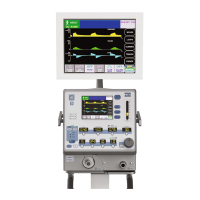Explanation of Modes, Breath Types and Special Functions
7
Pressure Control
Pressure Control Ventilation provides time-cycled, pressure limited
mandatory breaths. Inspiratory Pressure Limit and t Insp (inspiratory
time) are set parameters with tidal volume and flow allowed to vary
to meet the set parameters. The Slope/Rise may be adjusted via the
Advanced Data Set. A pressure control inspiration terminates when
the set inspiratory time has elapsed.
NOTE: If the Slope/Rise control is set too low, breathing circuit
pressure may not reach the pressure limit value by end inspiration.
Biphasic Pressure Release Ventilation
(Open Exhalation Valve On)
BiphasicPressureReleasemandatorybreathsaresimilartoPressure
Control mandatory breaths except that the exhalation valve remains
open during the inspiratory time. This allows the patient the option
of unrestricted spontaneous breathing even while pressure in the
circuit is elevated to the Pressure Limit level. This type of ventilation
isreferredtoas“BiphasicPressureReleaseVentilation”(BPRV).
It is considered to be more comfortable for patients with an active
respiratory drive who are ventilated with Pressure Control. Open
Exhalation Valve is turned ON via the Advanced Data Set to achieve
BRPVbreaths.
If a patient makes an expiratory effort, such as a cough, against a
closed exhalation system (i.e., Open Exhalation Valve OFF) during the
inspiratory phase of a pressure-controlled mandatory breath, airway
pressure will rise above the target pressure. When Open Exhalation
Valve is ON, the e360 Ventilator actively controls the exhalation
valve so that excess pressure is vented out, the degree of pressure
overshoot is minimized and airway pressure is maintained close to
the target pressure.
Figure 7-1B Decelerating Flow Waveform in VCV

